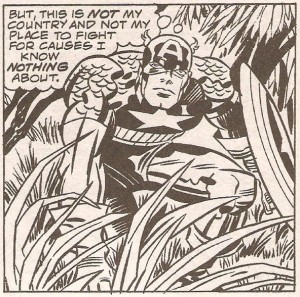Shame on you, Captain America!
I’d thought enough time had passed that I could forgive Jack Kirby. But I just learned I was wrong.
I was on staff at Marvel Comics in the mid-’70s when the King returned and tried to pick up where he’d left off. At the time, as I sat there in the Bullpen with my blue pencil and proofread the original art for some of his initial issues of titles such as Captain America, which he not only drew, but wrote and edited, I was horrified. The art could still be the stuff of dreams at times, but the words that came out of his characters’ mouths seemed more like a nightmare.
The buzz from us kids in the office wasn’t kind. I’ll admit it. Kirby was a god to us for what he did during the ’60s, but what he was doing at Marvel in the ’70s made us wince, and we didn’t have the tact or maturity to say it appropriately. So we acted like ungrateful punks. But now that the years have passed, as I read some of those issues of Captain America over again, I’m wincing still.
The reason I’m subjecting myself to them once more is because two of the backup stories I wrote at the time have been reprinted in The Essential Captain America Vol. 6, and after first rereading my own work (of course!), I decided to give Kirby’s another shot.
The powerful artwork still made me smile, and the frenetic pacing caused my childhood to rush back again, but as for the words on the page-Ouch!
Not only do none of the characters talk the way people actually talk-or even the hyperbolic, melodramatic way superheroes talk-but they are barely coherent. And what’s worse, in Captain America #207, old winghead, after discovering that a tyrannical dictator in a banana republic was torturing his people, decided to do NOTHING, basically declaring it none of his business!
Here’s that disturbing panel.

Until this rereading began, I was only offended by the crudeness and incomprehensibility of Kirby’s dialogue, but now, decades later, I’m also repulsed by Cap’s decision, no matter how well or poorly it was phrased.
Shame on you, Captain America!
If I ever needed a reminder of how much Stan Lee and Jack Kirby needed each other, neither ever creating separately at anywhere near the level they did when together, man oh man, this was certainly it.
Originally published at Scott Edelman. You can comment here or there.